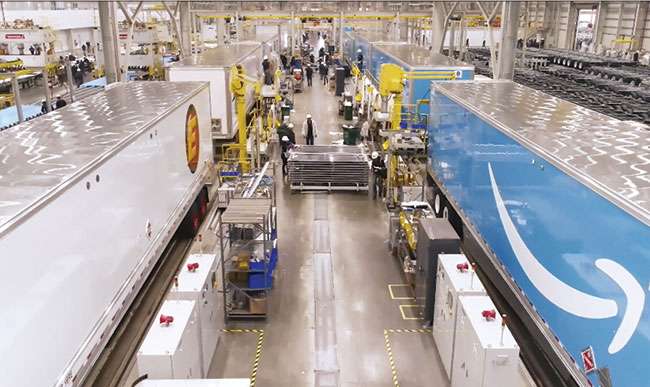Senior Reporter
June Trailer Orders Reach 11,000

[Stay on top of transportation news: Get TTNews in your inbox.]
U.S. trailer orders in June came in at 10,952 units, down from 13,441 a year earlier, ACT Research reported, marking the first year-over-year decline in net orders since May 2020.
The order softness belied ongoing demand for trailers in a strong freight market. But supply chain shortages, uncertainty about next year’s pricing and labor availability persist — causing production to be less than robust.
“While total production did improve in June, the gains came from additional days in the production schedule,” said Frank Maly, director of commercial vehicle transportation analysis at ACT.
June net US trailer orders of 10,952 units grew nearly 18% from the previous month, but were almost 20% lower compared to June of 2020.https://t.co/ocY63QRl7r#Trailers, #Transportation, #truck, #trucking, #ACTResearch #ACT pic.twitter.com/3q0RoKNSRA — ACT Research (@actresearch) July 22, 2021
On a positive note, June’s volume improved on May’s total of 8,676 — the year’s low point to date.
FTR pegged orders at 11,000 and noted most trailer makers are not yet taking orders for 2022.
“The production situation for early 2022 could be complicated if trailer makers cannot build all the orders currently on the books in 2021,” said Don Ake, vice president of commercial vehicles.
The trailer side is much less impacted by the computer chip shortage but still has a faulty supply chain, he said. “It’s still not flowing, trailer production is still being restricted by that and also production workers,” Ake said.
“It is probably 15 to 30 different components on the truck and trailer side,” he said. “The trailer side has more problems with some components in a greater number. Right now it looks like the industry is in catch-up mode [with demand] all the way through 2022 and into 2023.”
One fleet executive — with 40,000 assets including a combination of trailers, containers and dollies for hooking pup trailers together — has turned to deploying tracking technology to improve asset utilization.

Schwartz
“The trailer capacity is tight in the industry right now. And we are going to come into a fall peak season here pretty quick,” Rich Schwartz, vice president of engineering and corporate optimization at Estes Express Lines, told Transport Topics.
The company spends millions of dollars each year on trailers, Schwartz said. “We had build schedules adjusted right out of the gate this year. Lack of components, lack of flooring, just with the supply chain to build trailers. In some instances, we’ve moved build to next year,” he said.
Meanwhile, Estes is using Spireon’s FL Flex device on all of its trailering equipment, containers and dollies. It has GPS tracking and since it is modular, can be expanded with other sensors later.
“We have good yard organization, it isn’t just a free-for-all. But it will now be more precise. Each minute you save in the hundreds of hours, thousands of hours we are working, we see productivity improve and our moves-per-hour improve,” he said. “And we’ll be able to absorb the growth in our network.”
In addition, it helps drivers calling on a large distribution center with 300 trailers in a yard, for instance. “Now we know exactly where to go.” Or in a giant rail yard stacked with containers. “Now we just pull right up to it.”
Estes had 22,000 assets tagged as of late July, and uses 22 sites to do the installations with Spireon’s engineering team.
“My goal is to be done by the end of the year. It’s a big project so I tend to break it down in pieces. So tagging 1,000 pieces of equipment each week is our goal. That gets this completed by Christmas.”
At the same time, the traditional return of rental trailers from earlier off-peak has not happened this year, one executive with an equipment lessor said.
“Our utilization from January forward has continued to climb,” said Chuck Cannata, general manager of the highway division at Milestone Equipment Holdings, an equipment lessor.
Milestone has over 62,000 trailers ranging in age from new to 15 years old. “We are not as heavily dependent on the trailer makers’ supply,” said Cannata. “We are not tied to having 25% of our fleet growth be new CapEx.”

Willmott
Another consultant, Charles Willmott, principal at WillGo Transportation Consulting and a former chief sales officer at a trailer maker, said there are long backlogs for new trailers, dramatically escalating prices and trailer shortages across the board.
“The used trailer market is empty of inventory, the rental/leasing companies are near 100% utilization,” he said, “the repair shops are flooded, and parts are hard to get.”
In the typical trailer demand cycle, the challenges of shrinking a plant’s labor team followed by rehiring and training are enormous, said Willmott. “Not only does it wreak havoc on the lives of the workers, it causes big issues with manufacturing productivity, cash flow and quality control. Recovering from the COVID-19 shutdown has magnified these problems greatly.”
Want more news? Listen to today's daily briefing below or go here for more info:




